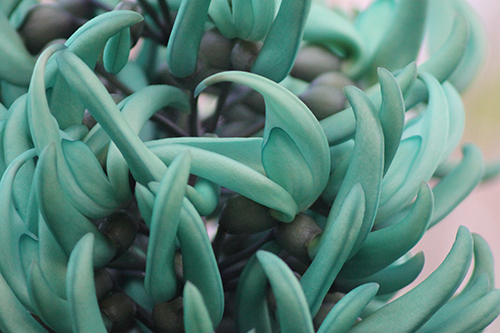Turquoise jade vine flowers have appeared for the first time in the tropical glasshouse at the University of Bristol Botanic Garden.
The jade vine (Strongylodon macrobotrys) is a member of the same family as peas and beans and can grow up to 100 metres in length in its native Philippines. Its flower spikes or racemes have been designed by nature to be pollinated by bats. The bat hangs upside down to drink nectar from the cup-shaped jade vine flower. At the same time, the flower deposits pollen on the back of the bat's head which it then carries off to pollinate the next flower.
Both the vine's natural habitat and pollinators are under threat in their native Philippines due to deforestation. The unusual characteristic flower coloration has been shown to be an example of copigmentation, a result of the presence of the chemicals malvin and saponarin.
The Botanic Garden sowed the seed obtained from the University of Cambridge Botanic Garden seven years ago. There are only a few gardens in the UK which have the jade vine, including Kew Gardens, the Botanic Gardens at the universities of Oxford and Cambridge and the Eden Project.
Nick Wray, Curator of the Botanic Garden, said: "The flowering of the jade vine after seven years of care is a horticultural triumph. This plant is unique in the West Country and this is the very first time that the plant has flowered here.
"It is only grown at six other gardens in the UK and this is a first for us. Its flower colour is exceptionally rare in plants and it is not fully understood the role of the colour as its pollinating bats use echolocation to find their food. Visitors to the garden are in for a treat, as it is very rare to see the vine in flower in this country."
Further information
About the University of Bristol Botanic Garden
The Botanic Garden has a strong evolutionary theme and cultivates over 5,000 plant species forming four core collections that illustrate plant evolution, plants from Mediterranean climates, useful plants (including Chinese and Western herb gardens) and rare and threatened native plants to the Bristol area.
Star attractions include an amazing dell demonstrating the evolution of land plants including the dinosaurs' favourite plants: ginkgos, cycads, tree ferns, monkey puzzles and the Wollemi Pine. Other delights include glasshouses, home to giant Amazon water lilies, tropical fruit and medicinal plants, including vanilla, chocolate, bananas, sugar cane, pineapples, orchids, cacti and a unique sacred lotus collection.
Normal admission and opening times
The Botanic Garden is open for seven days a week including bank holidays from 10 am until 4.30 pm (except during weekends in March when opening times are 10.30 am until 3 pm).
Admission is £7.70 (Gift Aid payment)* or £7 (non - Gift Aid payment); free to University staff and retired staff, Friends of the Botanic Garden, students and children under 18.
*The adult gate entry fee of £7.70 includes a 70p voluntary donation which UK taxpayers can pay, allowing the Botanic Garden to benefit from a 25 per cent refund of tax from the government on each adult ticket.
Dogs (except registered disability assistance dogs) are not permitted in the Botanic Garden.
The garden is accessible for wheelchairs and mobility scooters with a designated path leading around the garden and glasshouses. Disabled toilet facilities are available on site and a wheelchair is available upon request from the Welcome Lodge.
Pre-booked guided tours of the garden for groups of ten upwards are available seven days a week. Please contact the garden for further information. There is a charge for the guide of £8 per person.
Directions to the Botanic Garden
From the city centre go to the top of Whiteladies Road, at the junction and traffic lights go straight ahead across Durdham Down towards Stoke Bishop. At the traffic lights go straight ahead and take the first turning on the right into Stoke Park Road, the Botanic Garden at the Holmes is 150 metres on the right.
Members of the public wishing to support the work of the Botanic Garden should join the Friends of the Garden. For more information go to the Friends of the Botanic Garden or contact Sue Beech, The Membership Secretary, email: membership@fubbg.co.uk
